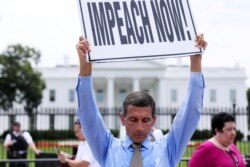For just the fourth time in U.S. history, lawmakers are holding public hearings to debate the possible impeachment of an American president.
The U.S. Constitution describes “impeachment” as a way for lawmakers in the House of Representatives to charge a government official with a crime. If they do, lawmakers in the Senate hold a trial to decide whether to remove the official from office.
Since 1788, when the Constitution was adopted, only three other U.S. presidents faced impeachment. None has been removed from office.
A ‘teachable moment’ for students
Official public hearings will begin Wednesday. Witnesses already have testified to several committees in closed-door hearings. They said they were concerned the president withheld Congressional-approved military aid to Ukraine in exchange for information on his political opponent, Joe Biden.
The president and his government deny wrongdoing, and have not agreed to requests for documents and witness interviews.
Around the country, schools are using the impeachment investigation as a “teachable moment” for students. At a rural North Carolina high school, the fifteen-and sixteen-year-olds in Aedrin Albright’s civics class had done their homework. They had read about impeachment in news stories. Now it was time to decide: Should President Donald Trump be impeached?
Students pulled their chairs across the room. The three who supported impeachment sat on one side. The fifteen students who opposed it sat on the other.
The ten undecided students were in the middle.
“Your job is to try to persuade your classmates in here to come to your side, to your understanding,” Albright told the teenagers at Chatham Central High School.
Albright asked students to make their arguments using the news stories they had read. They could change sides, and the undecideds were urged to choose one.
Overall, the discussion went well, Albright said. The anti-impeachment side gained three more students. One student joined her pro-impeachment classmates. And six students remained undecided.
Their mock votes show the political divisions across the country. Voters in the area around the school mostly supported Trump in the 2016 election. Another area nearby voted for his opponent, Hillary Clinton. And many Americans – and lawmakers – already have strong opinions about the president and are unlikely to change their beliefs.
In another area of the country, St. Paul, Minnesota, Mark Westpfhal teaches at the Capitol Hill Gifted and Talented School. The school is located in “an extremely liberal” area, he said. Most of his students support Trump’s impeachment and removal from office.
In September, Westpfhal put together a three-day impeachment lesson for the twelve- and thirteen-year-olds in his American studies class. He required his students to differentiate between what they believe and what they know about the president’s actions.
They were “quick to argue that he has done so many illegal things,” Westpfhal said. “But when I asked them to describe the things he has done and how those things violated the law, they slowed down a little.”
Westpfhal often brings current events into his lesson plans. He said his class discusses “how emotion and partisanship” can dictate, or control, people’s views.
I’m Kelly Jean Kelly.
Anne Ball wrote this story, with information from the Associated Press. Kelly Jean Kelly was the editor.
What do you think of this story? Write to us in the comments section below.
________________________________________________________________
Words in This Story
impeachment - n. the process of charging a public official with a crime done while in office
persuade – v. to cause (someone) to do something by asking, arguing, or giving reasons
teenager – n. someone who is between 13 and 19 years old
mock – adj. done or performed to look like the real thing
differentiate – v. to make (someone or something) different in some way
partisanship - n. a person who strongly supports a particular leader, group, or cause







